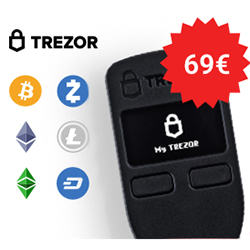 My-Bitcoin.net
My-Bitcoin.net
Actual transactions
How to secure your bitcoins
One of the disadvantages of decentralization is the necessity to rely on oneself. In the monetary world, where you have your money stored in an account, it’s the bank that is liable for any stolen funds. In the world of bitcoin, you have to rely just on yourself. If your bitcoins get stolen because of your inadequate protective measures, you’ll not see them again. And it doesn’t have to be just theft on its own, but with bitcoins you can also lose your data stored on the same disc.
It’s therefore vitally important to achieve high levels of security, including adequate backing up of your data.
It’s necessary to always back up your data and sufficiently protect private keys to all addresses at which you keep your funds. The official bitcoin client enables to backup the walet.dat file in which the wallet stores the private keys to the addresses. But a big disadvantage is that when using a new address, it’s necessary to back up this file again, because a new private key is generated at the same time with the new address.
This issue has been sorted out by using the BIP32 protocol.
BIP32
This protocol eliminates the necessity of repeated renewal of the private key. The way it works is that it generates new bitcoin addresses, including the private keys to these addresses, from the main keys (xprivate and xpub).You just need to safely keep the main hash and you’ll always be able to generate the rest of your addresses. To simplify the use, BIP39 was added which replaces the hard-to-remember xprivate and xpub with 24 words (seed).These 24 words is all you need to gain access to all of your bitcoins.
 BIP 32 graph
BIP 32 graph
Paper
Even though bitcoin is a virtual currency, it’s possible to store bitcoins on paper. You don’t keep the bitcoin as such with you. It’s stored on an internet address where each user stores information on their deposits. All you need for handling is a key to this address which can be stored for example on paper. Most commonly in the form of a QR code for fast uploading.
 Bitcoin on paper
Bitcoin on paper
Software
You can choose from a large number of wallets for working with bitcoins. These differ from the official client which works with the entire blockchain (which itself is the size of several tens of GBs) to clients that only store private keys and verify all individual transactions in the blockchain against the server. The clients can be further divided according to the method they use for saving the private keys (BIP32 etc.) or according to the hardware support.
The list of all available wallets can be found on the bitcoin wallets page.
Hardware
If you own a large amount of bitcoins, we recommend using a Bitcoin trezor. This is a type of hardware designed specially for bitcoins which stores private keys so safely that no hacker can get to them. You then upload your 24 words on this hardware which will be used for generating your keys. All you need to do is to back up these words.
 Bitcoin trezor
Bitcoin trezor
Cryptosteel
For storing your words you can also use paper, or use a specially designed device, Cryptosteel, a non-flammable, indestructible storage system where you can safely keep your words and the bitcoin seed.
 Cryptosteel
Cryptosteel
Bitcoin Price Index

 #bitcoin Tweets
#bitcoin Tweets

